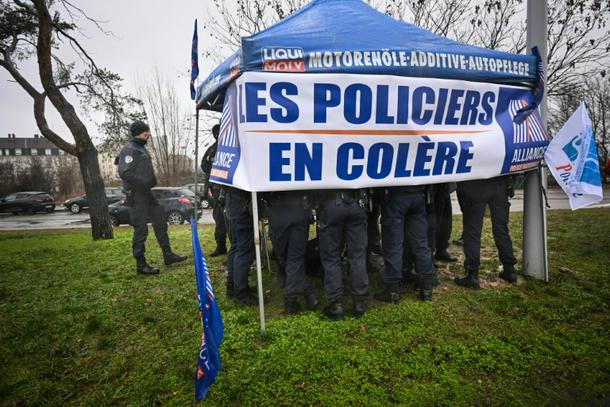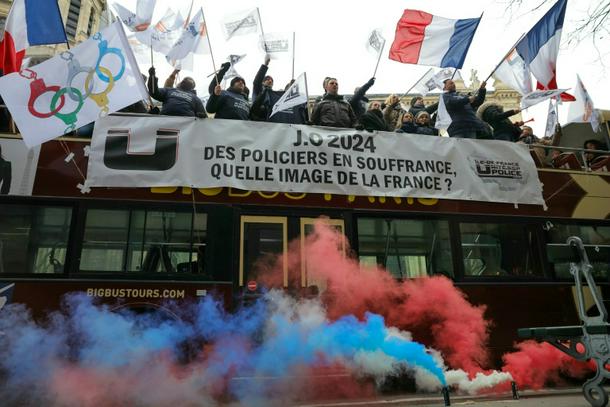
"Police officers are angry" reads a banner at a protest in in Strasbourg on Thursday
Paris (AFP) - Hundreds of police officers protested across France on Thursday to press their claim for extra pay during this year’s Paris Olympics, underlining the threat of strikes and disruption to the Games.
Aware of the risk to the country’s image, French authorities are scrambling to agree pay deals with a host of public sector trade unions who are demanding bonuses for working during the July 26-August 11 Olympics.
In Paris, several hundred officers gathered near the police headquarters.
“The Olympics will be without us,” chanted the protesters, holding flags and banners.
Fabien Vanhemelryck, head of the Alliance union, warned that the protests were “only just beginning” if authorities did not meet their demands.
“If we don’t get the recognition we deserve for our investment, we won’t be there”.
Several police unions had urged officers to show “minimum activity” on a so-called “Black Thursday” of protests.
“For an exceptional event, exceptional measures,” Alliance wrote in a statement that explained how unions wanted up to 2,000 euros ($2,200) for their members in compensation for lost holidays and extra work over the summer Games.
In Strasbourg, around forty police officers gathered despite pouring rain, disrupting traffic at the entrance to the Europe Bridge connecting France to Germany.
“We only know that everyone has been asked to work,” officer Lionel Maunier, a regional Alliance union leader, said.
“But we’ve got kids, some of us are also carers. We don’t know how we’re going to manage.”
At Paris Charles-de-Gaulle airport, police went on strike early in the day, forcing passengers to wait an extra hour, according to an airport source.
Interior Minister Gerald Darmanin met police representatives on Monday and has a fund for the Games of around 500 million euros, sources close to the negotiations told AFP on condition of anonymity.

Thursday's protest is the second day of action by police this month
France is banking on its first Olympics in 100 years to showcase the best of the country from the historic monuments of Paris to its role as a global centre of food, fashion and sporting excellence.
Organisers are desperate to avoid reinforcing France’s reputation for violent street protests and industrial disputes.
The country was shaken by so-called “Yellow Vest” anti-government protests in 2018, massive strikes against pension reform last year, as well as urban riots in June.
“The Olympics are a double-edged sword for the image of a country,” communications expert Philippe Moreau Chevrolet, who founded the Paris-based MCBG Conseil PR agency, told AFP.
A major security problem or disruption can wipe out any benefits of playing host, he explained.
“The strikes, riots and Yellow Vests created a poor image of France as a destination,” he added.
- ‘Dialogue’ -
Pay negotiations are underway between French authorities and health workers, drivers for Paris metros, trains and buses, as well as municipal employees such as street cleaners.
Holidays during the Games have been banned for many state employees, while extra weekend and late-night work will be demanded for tens of thousands of them.
“It’s being dealt with ministry by ministry, taking into account the status and requirements for each profession,” Michel Cadot, who heads the government’s Games coordination committee, told a Senate hearing on Wednesday.
“We are watching closely to ensure that it is all being dealt with through dialogue,” Cadot added.
He told the hearing that the overall budget for the Games remained unknown in part because the government could not anticipate how much it would need to spend in bonuses for public sector workers.
The country’s militant air traffic controllers declared a “truce” in September in their fight for higher pay until after the Olympics, leading to accusations from a former labour minister that the government had “paid a ransom” to avoid travel chaos.
Around 30,000 police officers are expected to be on duty during the Games, which will take place at what is usually the peak of the summer holiday period in France.
On Wednesday, the hard-left CGT union demonstrated in front of the headquarters of the Olympics organising committee in northern Paris to denounce the government’s decision to suspend some workers’ rights during the Games.
Unless the government reverses its decree, “we will launch high-impact operations during the Games,” said Amar Lagha, the head of the CGT’s branch representing the private-sector service industry and retail workers.
The Paralympics run after the Olympics from August 28-September 8.
asl-alh-sm-adp-as/dj